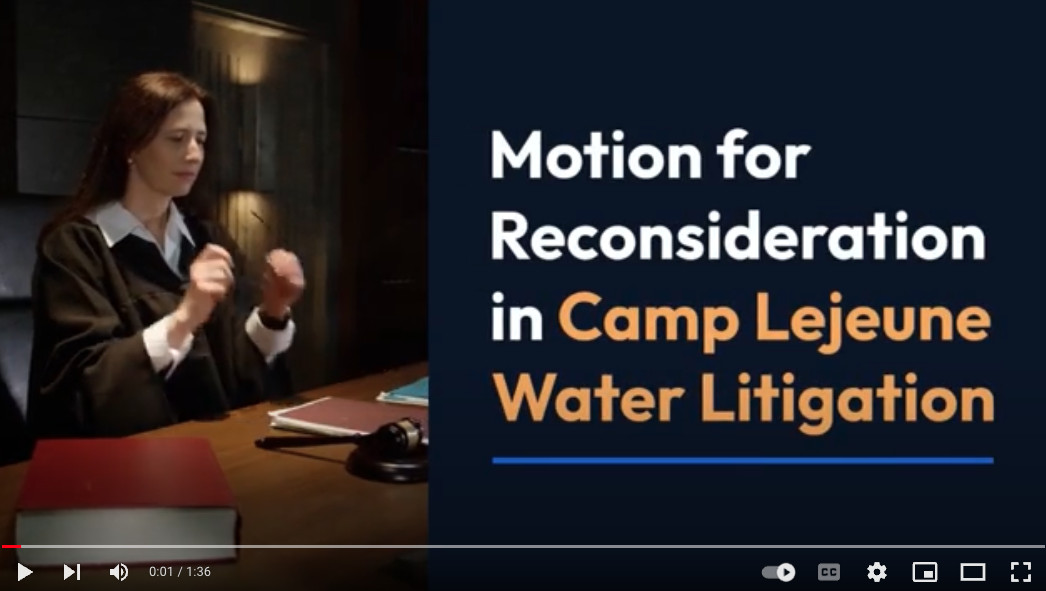Camp Lejeune Attorney Drama Breaks Out in Water Contamination Lawsuit in August 16th 2023 Filing
Camp Lejeune Lawsuit Attorneys Concerned About Their Clients Under the New Leadership Structure's lack of Transparency.

As mentioned in a prior Camp Lejeune Lawsuit News update, the court appointed a plaintiffs steering committee to lead the consolidated cases. The latest filing, submitted by Roy T. Wiley IV and Blake G. Abbott of Poulin | Willey | Anastopoulo, LLC indicates that leadership attorneys were appointed to the various committees without it being recorded on the docket or any formal or known application process. This latest filing calls for the court to change the consolidated case to an Opt-Out class action in order that every plaintiff has their rights in tact and attorneys can actually make the best choices for their clients (i.e. they can opt out of the class if they want to.)
I can certainly understand the frustration of secret committee appointments and lack of transparency to all attorneys representing plaintiffs. I guess we'll see if the court agrees and the moment we do know who was "secretly" appointed to various committees, we will be sure to publish it here.
Here is the text of the filing, taken from the pdf file on CourtListener.
IN THE UNITED STATES DISTRICT COURT
FOR THE EASTERN DISTRICT OF NORTH CAROLINA
SOUTHERN DIVISION
Case No. 7:23-cv-897
IN RE: )
) MOTION FOR RECONSIDERATION
CAMP LEJEUNE WATER LITIGATION ) OF JULY 19, 2023 ORDER (Dkt. No. 10)
)
This Document Relates To: )
ALL CASES )
)
NOW COMES undersigned counsel in the above captioned Action (hereafter,
"Counsel”), who files this Motion for Reconsideration of this Court’s Order dated July 19,
2023(Dkt. No. 10), and for cause herein requests this Court reconsider its July 19, 2023,
Omnibus Order on the Camp Lejeune Water Litigation.
BACKGROUND
These actions arise out of the injuries suffered by thousands of service members, civilian
workers, and family members who were exposed to contaminated water at Marine Corps Base
Camp Lejeune (“Camp Lejeune”).1 For more than three decades, toxic chemicals escaped from
fuel tanks, industrial facilities, and other sources on and around Camp Lejeune and seeped into
the groundwater below. 2 By drinking, cooking with, bathing in, and otherwise coming into
contact with that water, hundreds of thousands of men and women working and residing on base
were exposed to these chemicals, greatly increasing their risk of contracting cancer and the
myriad other life-destroying diseases they are known to cause.3
1
See Williams et al. v. United States of America, Case No. 7:23-cv-00022-D-KS Dkt. No. 1 at ¶
1.
2
Id.
3
Id.
1
Case 7:23-cv-00897-RJ Document 13 Filed 08/16/23 Page 1 of 12
After years of debate over the appropriate remedy to this issue, on August 10, 2022, the
President signed into law the “Honoring our PACT Act of 2022” (“PACT Act”), which
incorporates at Section 804 the Camp Lejeune Justice Act (“CLJA”).4 The CLJA establishes a
simple cause of action permitting individuals who were harmed by the contaminated water at
Camp Lejeune over the relevant period to file for compensation in this Court.5
On April 25, 2025, all currently filed cases were consolidated in the E.D.N.C. under the
caption Camp Lejeune Water Litigation v. United States of America, Case No. 7:23-cv-00897-
RJ. 6 This Court ordered on May 22, 2023, that all parties interested in a Leadership role to
submit materials by May 26, 2023. 7 On June 6, 2023, the Court stated that it would begin
interviews unless good cause was shown by July 3, 2023, as to why it should not.8 Defendant
United States of America issued its response letter on June 29, 20239, and the undersigned firm
filed its letter restating its position that while leadership appointments were fine, the class vehicle
was the best method for these cases to progress to resolution.10 This Court, in its Order dated
July 19, 2023, appointed a leadership committee comprised of various attorneys and firms.11 This
order created Plaintiffs’ Leadership Counsel, along with several committees to be determined at
the discretion of the named Leadership Counsel. 12 This order also gave sweeping powers to the
4
Id. at ¶ 4
5
Id.
6
See Camp Lejeune Water Litigation v. United States of America Case No. 7:23-cv-00897-RJ
Dkt. No. 1
7
Id. at Dkt. No. 4
8
Id. at Dkt. No. 6
9
Id. at Dkt. No. 8
10
Id. at Dkt. No. 9
11
Id. at Dkt. No. 10
12 Id.
2
Case 7:23-cv-00897-RJ Document 13 Filed 08/16/23 Page 2 of 12
Leadership committee to meet and confer, litigate, argue, resolve and otherwise handle the
entirety of all the cases currently appearing on this consolidated docket.13
LEGAL STANDARD
Fed. R. Civ. P. 54(b) provides that “when an action presents more than one claim for
relief – whether as a claim, counterclaim, crossclaim, or third-party claim – or when multiple
parties are involved, the court may direct entry of a final judgment as to one or more,
but fewer than all, claims or parties only if the court expressly determines that
there is no just reason for delay. Otherwise, any order or other decision,
however designated, that adjudicates fewer than all the claims or the rights
and liabilities of fewer than all the parties does not end the action as to any
of the claims or parties and may be revised at any time before the entry of a
judgment adjudicating all the claims and all the parties’ rights and liabilities.”
“Under Rule 54(b), the district court retains the power to reconsider and modify its interlocutory
judgments . . . at any time prior to final judgment when such is warranted.” Am. Canoe Ass’n v.
Murphy Farms, Inc., 326 F.3d 505, 514-15 (4th Cir. 2003); see also Moses H. Cone Mem. Hosp.
v. Mercury Constr. Corp., 460 U.S. 1, 12 (1983) (noting that “every order short of a final
decree.) Under Federal Rule of Civil Procedure 54(b), “any order or other decision, however
designated, that adjudicates fewer than all the claims or the rights and liabilities of fewer than all
the parties” may be revisited by the court at any time before an entry of final judgment. Fed. R.
Civ. P. 54(b).
13
Id.
3
Case 7:23-cv-00897-RJ Document 13 Filed 08/16/23 Page 3 of 12
ARGUMENT
Rule 54 does not set out a standard for reconsideration of interlocutory orders, like the
one at issue here. The Fourth Circuit has held that a motion for reconsideration under Rule 54 is
not subject to the same “strict standards” applicable to motions for reconsideration of a final
judgment. Am. Canoe Ass'n v. Murphy Farms, Inc., 326 F.3d 505, 514 (4th Cir.2003).
Motions for reconsideration of interlocutory orders are subject to a lower standard, and they are
appropriately granted only in the following circumstances: (1) the discovery of new evidence, (2)
an intervening development or change in the controlling law, or (3) the need to correct a clear
error or prevent manifest injustice. Pender v. Bank of America Corp., No. 3:05–CV–238–GCM,
2011 WL 62115 at *1 (W.D.N.C. Jan. 7, 2011) (Mullen, J.)(emphasis added); see also Stephens
v. Wachovia Corp., No. 3:06–CV–246–MR, 2008 WL 1820928 at *2 (W.D.N.C. Apr. 21,
2008) (noting that “the decision whether to reconsider or modify an interlocutory order is a
matter within the discretion of the Court”); Akeva, L.L.C. v. Adidas America, Inc., 385 F.Supp.2d
559, 565 (M.D.N.C.2005).
A. The Court Should Reconsider Its Leadership Order Given Controlling Law
and Conduct Leadership Appointment Pursuant to F.R.C.P. Rule 23, if at all.
In this Court’s Order appointing leadership counsel and their duties, the court cites no
controlling case law or statute that grants it the authority to do so at this stage in the litigation.14
In fact, as this court noted, this case is not a multidistrict litigation (“MDL”) or eligible for MDL
treatment, so traditional centralization of the cases would not be applicable here. Forcing
consolidation on undersigned counsel’s clients is an improper error and against the spirit of the
law, as this Court has noted, and the Fourth Circuit agrees. See Intown Properties Management,
Inc. v. Wheaton Van Lines, 271 F.3d 164, 168 (4th Cir.2001)(“Consolidation is permitted as a
14
See generally Id. at Dkt. No. 10
4
Case 7:23-cv-00897-RJ Document 13 Filed 08/16/23 Page 4 of 12
matter of convenience and economy in administration, [but] does not merge the suits into a
single cause, or change the rights of the parties, or make those who are parties in one suit
parties in another.”)(emphasis added). Accordingly, forcing the parties to consolidate under the
ordered leadership structure, and permitting those select counsel to unilaterally litigate the
parties’ rights, without the power of an MDL is in violation of well-established Fourth Circuit
precedent. Moreover, there is no inherent authority in the Court to conduct such a consolidation
and appointment when the Rules of Civil Procedure and controlling law provided specified
procedures for the same.
Rule 23, for example, would create a perfect vehicle for consolidation and appointment
of leadership, without creating any additional prejudice or undue burden on any party named to
this litigation. Consolidation under Rule 23 is also supported by the first filed case being a class
action15, further encouraging Rule 23 as the most appropriate way to handle the ever-growing
docket of Camp Lejeune cases in the manner that the Court desires. In the first filed action, filed
by the undersigned, the class is defined as “all persons who were stationed at Camp Lejeune
during the relevant time period suffering from medical diagnosis as a result of their exposure to
contaminated water sources and have exhausted their administrative remedies as required by the
PACT Act and FTCA.”16 The Court is also able to appoint an interim leadership structure under
F.R.C.P. Rule 23(g)(3) before making any decision regarding certification of the class or classes
(“The court may designate interim counsel to act on behalf of a putative class before determining
whether to certify the action as a class action.”).
15
See Williams et al. v. United States of America, Case No. 7:23-cv-00022-D-KS Dkt. No. 1
16
Id. Dkt. No. 1 at ¶ 6
5
Case 7:23-cv-00897-RJ Document 13 Filed 08/16/23 Page 5 of 12
When the Court does reach the certification question, there are several criteria that must
be met. First, the class must comply with the four prerequisites established in Rule 23(a): (1)
numerosity of parties; (2) commonality of factual and legal issues; (3) typicality of claims and
defenses of class representatives; and (4) adequacy of representation. Fed.R.Civ.P. 23(a).
Second, the class action must fall within one of the three categories enumerated in Rule 23(b). If
a lawsuit meets these requirements, certification as a class action serves important public
purpose. In addition to promoting judicial economy and efficiency, class actions also “afford
aggrieved persons a remedy if it is not economically feasible to obtain relief through the
traditional framework of multiple individual damage actions.” 5 James Wm. Moore et
al., Moore's Federal Practice § 23.02 (3d ed.1999). Thus, federal courts should “give Rule 23 a
liberal rather than restrictive construction, adopting a standard of flexibility in application which
will in the particular case ‘best serve the ends of justice for the affected parties and...promote
judicial efficiency.’ “ In re A.H. Robins, 880 F.2d 709, 740 (4th Cir. 1989).
To be sure, Rule 23(b)(3) class actions must meet predominance and superiority
requirements not imposed on other kinds of class actions. This is because these suits, like the
ones at issue in this case, involve situations where “class action treatment is not as clearly called
for.” Fed.R.Civ.P. 23 advisory committee's note (1966 Amendment, subdivision (b)(3)).
However, as the Supreme Court has noted, the predominance and superiority requirements
in Rule 23(b)(3) do not foreclose the possibility of mass tort class actions, but merely ensure that
class certification in such cases “achieve economies of time, effort, and expense, and promote ...
uniformity of decision as to persons similarly situated, without sacrificing procedural fairness or
bringing about other undesirable results.” Amchem, 521 U.S. at 615, 117 S.Ct. 2231 (quoting
Adv. Comm. Notes, 28 U.S.C.App. at 697)(emphasis added). For these very reasons, we have
6
Case 7:23-cv-00897-RJ Document 13 Filed 08/16/23 Page 6 of 12
expressly “embraced the view that the mass tort action for damages may be appropriate for class
action, either partially or in whole.” Central Wesleyan Coll. v. W.R. Grace & Co., 6 F.3d 177,
185 (4th Cir.1992) (citation, internal quotation marks, ellipses, and alterations omitted).
Here, undersigned counsel seek to proceed under Rule 23(b)(3), which, as stated above,
requires that common issues predominate over individual ones and that a class action be superior
to other available methods of adjudication. Fed.R.Civ.P. 23(b)(3). Even with this higher scrutiny,
the handling of claims under the class action mechanism of Rule 23 of the Federal Rules of Civil
Procedure remains the best and only approach to effective judicial management of these cases by
channeling individual claims into the proposed Tranche system submitted by the undersigned.
Given the 20,000 or so filed CLJA claims with the department of the Navy, there is no
question that numerosity under Rule 23(a)(1) is satisfied here. Further, all claims currently
pending in this district over CLJA suits all raise the same legal claims, arise from the same
standard conduct by Defendant that equally impacted all possible class members, and the
damages experienced as a result of Defendant’s actions are substantially similar—given the list
of pre-approved conditions—satisfying the requirements of commonality and typicality under
Rule 23(a)(2) and Rule 23 (a)(3). With regard to Rule 23(a)(4) adequacy, the court recognized
that “class representatives” must “be part of the same class and possess the same interest and
suffer the same injury as the class members” and found that in this case the named plaintiffs
satisfied these requirements, noting particularly that no “potential conflict existed” among class
members. See Broussard v. Meineke, 155 F.3d 331, 337–38 (4th Cir.1998) (holding “manifest
conflicts of interest” among members of class precludes class certification).
In addition to the satisfied elements listed above, the resolution of issues on a class-wide
basis will not necessarily impact any cases that ultimately choose to opt-out, and importantly the
7
Case 7:23-cv-00897-RJ Document 13 Filed 08/16/23 Page 7 of 12
Court would not be depriving any opt-out parties of their rights nor forcing them to join a case or
be represented by counsel in the handling of their case that they do not want to. As a result,
consolidation and appointment of leadership under Rule 23 has the added benefit of removing
potential appellate issues early on (and issues that could be raised later after final judgment), and
prevents those individualized cases from moving along their own track simultaneously. For these
reasons, Rule 23 of the Federal Rules of Civil Procedure remains the best and only approach to
effective judicial management of these cases.
B. The Court Should Reconsider Its Order Out Of A Need to Correct a Clear
Error or Prevent Manifest Injustice.
The third point, the need to correct a clear error or prevent manifest injustice, is another
reason that Plaintiff now requests Rule 54(b) relief through this Court’s review and correction of
its July 19, 2023, Leadership Order (Dkt. No. 10). In the context of a motion for
reconsideration, manifest injustice is defined as “an error by the court that is ‘direct, obvious, and
observable.’ ” Register v. Cameron & Barkley Co., 481 F. Supp. 2d 479, 480 n.1 (D.S.C. 2007).
This Order, amongst other things, outlined positions and responsibilities for various
groups within the established leadership committees.17 This included Lead and Co-lead Counsel,
Liaison Counsel, and Plaintiffs’ Executive Committee. All of these positions were granted broad
sweeping authority as it related to all filed cases currently pending on the Camp Lejeune docket.
This includes meeting with opposing counsel and handling court ordered meet and confers,
serving as spokespeople for all plaintiffs during proceedings in response to any inquiries by the
17 See Camp Lejeune Water Litigation v. United States of America Case No. 7:23-cv-00897-RJ
Dkt. No. 10
8
Case 7:23-cv-00897-RJ Document 13 Filed 08/16/23 Page 8 of 12
Court or opposing counsel, and working the cases through resolution (including with the Court
appointing a member of the Resolution Committee).18
These positions grant leadership the right to decide the entire scope of litigation on behalf
of Plaintiffs they do not represent, which could create large issues with the direction of litigation,
as leadership may disagree with the route individual counsel will seek in their cases and deprives
the litigants of their right to choose their own counsel. By removing the powers of litigation
handling from individual counsel, this court has effectively made individual counsel unable to
provide any direction or input to their clients’ cases and thereby stripped certain procedural
rights from undersigned counsel and their clients.
By way of example, it was discovered during a meeting this past week, that Plaintiffs’
Steering and Executive Committee Members had been notified of their selections by the
Leadership. Counsel did not receive a copy of the committee slate selections, the selections were
not filed on the public docket, and clients injured in this litigation have not been made aware of
who has been selected to act on their behalf. To be sure, Lead counsel has agreed to provide the
names, but post-process notice is hardly transparent. The nature of this private selection process
calls into question the behavior of leadership counsel and the maintenance of relationships with
those representing clients. While we understand that leadership is very busy, this inability to
have contact and discussions with leadership on the status and plan for the leadership committees
governing our individual cases is troubling, and further creates fear that contact will also be
withheld at later and more important stages of litigation, something that we believe the court
would agree is wholly unacceptable.
18
Id. at ¶ 2
9
Case 7:23-cv-00897-RJ Document 13 Filed 08/16/23 Page 9 of 12
As stated above, forcing consolidation on undersigned counsel’s clients under this
leadership structure is an improper error and against the spirit of the law, as this Court has noted,
and the Fourth Circuit agrees. See Intown Properties Management, Inc. v. Wheaton Van Lines,
271 F.3d 164, 168 (4th Cir.2001)(“Consolidation is permitted as a matter of convenience and
economy in administration, [but] does not merge the suits into a single cause, or change the
rights of the parties, or make those who are parties in one suit parties in another.”)(emphasis
added). Accordingly, maintain the Order that forces the parties to consolidate without the power
of an MDL or under the Rule 23 mechanism for doing so, and without citation to any direct or
indirect authority to do so, would be in violation of well-established Fourth Circuit precedent.
This would create an error by the court that is direct, obvious, and observable given the impact
this decision has already had on the matters involved in this litigation.
CONCLUSION
For the reasons outlined above, undersigned counsel believes that this Court’s Leadership
Order should be reviewed and appropriately rescinded or amended under Rule 59 as it displays
no controlling law and creates a direct, obvious, and observable injury to the rights of the parties
who have been forced to consolidate under this leadership structure, even if they do not support
the consolidation as it exists in the Order.
Dated: 08/16/2023
[signatures on following page]
10
Case 7:23-cv-00897-RJ Document 13 Filed 08/16/23 Page 10 of 12
/s/ Roy T. Willey, IV
Blake G. Abbott (N.C. Bar No. 57190)
Roy T. Willey, IV (Pro Hac Vice)
Poulin | Willey | Anastopoulo, LLC
32 Ann Street
Charleston, SC 29403
843-834-4712
blake@akimlawfirm.com
roy@akimlawfirm.com
Attorneys for Plaintiff
11
Case 7:23-cv-00897-RJ Document 13 Filed 08/16/23 Page 11 of 12
CERTIFICATE OF SERVICE
I hereby certify that on this date, a true and correct copy of the foregoing Motion for
Reconsideration was filed with the Clerk of Court using the CM/ECF system, which
automatically sends e-mail notification of such filing to all attorneys of record.
This 16th day of August, 2023.
/s/ Roy T. Willey, IV
Roy T. Willey, IV




